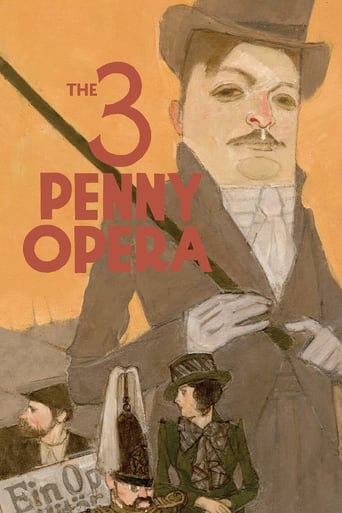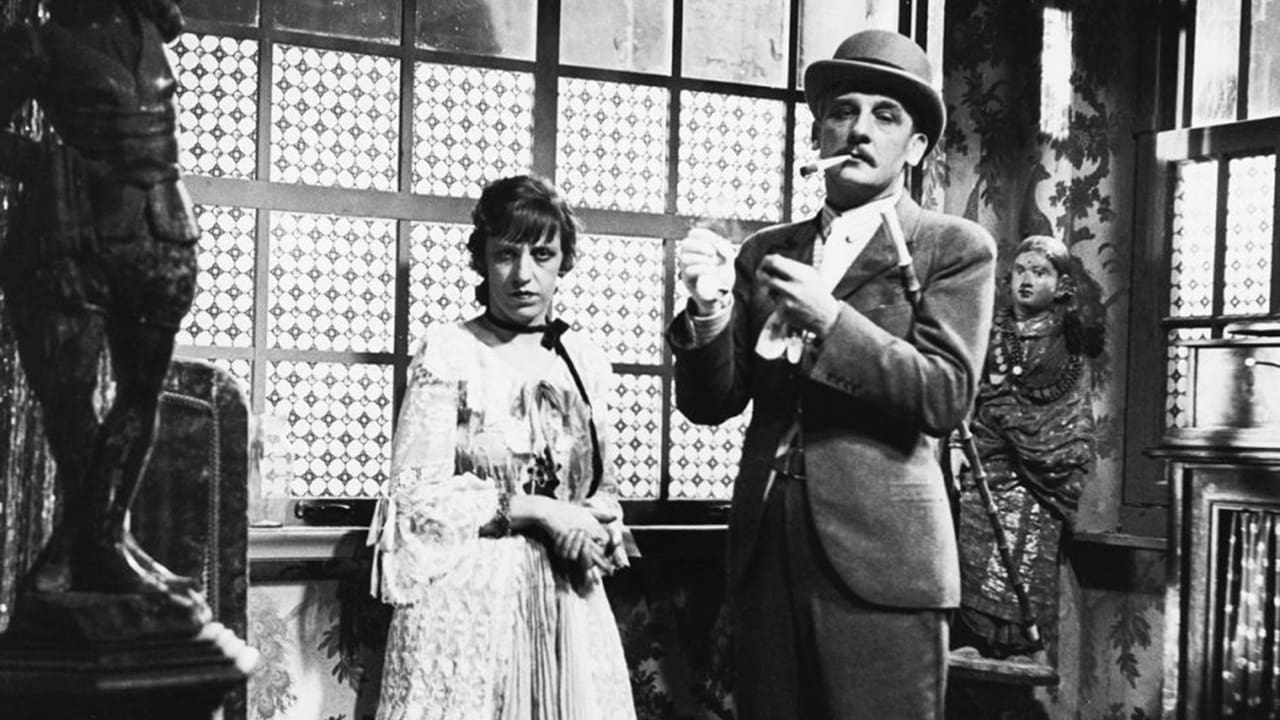drystyx
This s a well done, well written piece. There is a problem. It is way before its time. I know of few humans who are ready to watch this without being brainwashed the opposite way it is intended. Humans just aren't evolved. They aren't civilized yet.This is a movie that should be on file, and viewed by those mature enough to understand it. If anything is R rated, this is. And even most people under 40 years old will get the wrong idea.It is a dreary story of hopelessness, of how monsters rise to power.However, don't get the idea that the Nazis who banned this were against the propaganda it meant for the ignorant masses. There's a chess game being played when movies are "banned".So we have a musical, with two fairly noteworthy tunes, one in the beginning about Mac the Knife, and one in the end about the cannon's thunder, but the rest of the music is not quite as memorable, but the music is almost always theatrical and eerie. Another striking part of this piece is the total Western European conglomeration. It is German made, but based in England, and many of the performers have French accents. It is meant, of course, to ridicule the British idealism most of all. However, as art, it is much broader in scope.It is the message that is key here. It is so easily lost. The message is a valid one. The three key power figures, aside from the cameo of a queen figure, are vile, vicious, ugly, and horrible. Mac the Knife is a homicidal maniac (that's open to "interpretation", but it is what reality would be, if this actually took place). The queen and the other female power figure are depicted as very stupid and just bred to be contrary to good.I say Mac is a homicidal maniac, and that's from the information in the movie. I believe the original Mac was meant to be innocent, but this movie depicts an obvious human demon at work.But all of their power is because people give it to them. All through the movie, the other characters kowtow to them. Brown nosing and butt kissing are understatements. The other characters treat these three as gods. It is unfortunate how close to real life this really is. When one realizes that fear and jealousy are leading factors in decision making, one sees how such incompetent people rise to the top. Take the talent contest that requires five semi finalists from thirty contestants. I have witnessed, as an objective bystander, how this works. The connections of each one clap only for their "pet", and for the four ugliest, least talented of the other contestants. They want to ensure their "pet" is up against the weakest competition.So no wonder that the worst survives in capitalist style democratic societies. Our choices are always from the worst. Humans may be evolving backwards, or perhaps we need another thousand years for this work to be seen by an intelligent species.It is not even possible for someone to fail to be successful, to fail to rise to power, if someone gets the support these three get.While it may seem to the mature mind to be vindictive of power mongers such as the Nazis of the era, it is also supportive when viewed by most people.Even today, there are ignorant masses who would consider Mac the Knife and Peachem as "cool", simply because they have control. The only thing the Three Penny Opera doesn't do is illustrate their evil deeds in detail.Tiberius, no great humanitarian himself, but moderate compared to those who followed, said of Nero, "we are breeding a monster". But this film doesn't "celebrate" it. Instead, it shows the "monsters celebrating".Perhaps it is only a hundred years ahead of its time. Perhaps two hundred. Perhaps ten thousand. It isn't ready for the masses yet, or the masses aren't ready for this, but this is an eerie story, well told, and the emotion is great. The singing of Mac The Knife blows the cheery unemotional Bobby Darin one away, and Darin was a great singer. This had feeling, though.
Claudio Carvalho
In London, the rascal Mackie Messer (Rudolf Forster) is the king of the thieves and an irresistible pimp. When he meets Polly Peachum (Valeska Gert) on the street, he invites her for a drink and they marry with each other in the end of the night in a warehouse. When Polly's father Jonathan Jeremiah Peachum (Fritz Rasp) a.k.a. the king of the beggars learns about the marriage of his daughter, he presses the chief of police Jackie "Tiger" Brown (Reinhold Schünzel) to arrest his friend Mackie; otherwise he will send a great number of beggars to protest in the coronation of the queen. "Die 3 Groschen-Oper" is a cynical musical with low-life characters in the underground of London written by Bertold Brecht and directed by Georg Wilhelm Pabst. This film was released in Berlin on 19 February 1931 and I saw a DVD with a matrix that was restored in 2006 for the 75th anniversary of this film. In 1986, the Brazilian composer Chico Buarque de Holanda and the director Ruy Guerra released an adaptation of this musical with the successful "Ópera do Malandro", the most expensive Brazilian production until 1986, but without the credit to Bertold Brecht. My vote is eight.Title (Brazil): "A Ópera dos Três Vinténs" ("The Opera of Three Pennies")
Terrell-4
"You gents who to a virtuous life would lead us, and turn us from all wrongdoing and sin...first of all see to it that you feed us, then start your preaching. That's where to begin..." Bertolt Brecht was a hard-nosed socialist, an unpleasant and selfish gent who often took others' ideas and transformed them into something uniquely forceful and original. He believed that the proletariat struggle against the bourgeoisie was unending. When he and the composer Kurt Weill, equally original and talented in Weimar Germany, but who was not nearly so politically rigid or so personally obnoxious, collaborated on Die Dreigoschenoper in 1928, it probably flabbergasted them both to have a huge popular success on their hands. Much of the reason is Weill's clever, pungent score, but a lot of the credit goes to Brecht's utter cynicism about how the privileged behave to the workers. Says one of Threepenny's characters, "The rich of this world have no qualms about causing misery but can't stand the sight of it." The movie G. W. Pabst made from the theater production eliminates great junks of Weill's music. One would think this would be a terrible mistake. What we have, however, is a movie of social criticism that is so cynical with such self-serving characters that the songs Pabst kept seem to lift an already excellent film into greatness. We're seeing the story of Mackie Messer (Rudolf Forster), a man as charming as a snake. He's a murderer, a rapist, an arsonist, a thief...all tools of his trade. Mackie in his tight suit, grey bowler hat and with his ivory cigar holder preys on others. We learn all about Mackie when a street singer (Ernst Busch) entertains the crowd with stories of his crimes. When Mackie "marries" Polly Peachum (Carola Neher), however, he encounters the wrath of Mr. Peachum (Fritz Rasp), London's king of the beggars. Soon Mackie's great pal, Tiger Brown (Reinhold Schunzel), London's chief of police, cannot protect Mackie when Peachum threatens to unleash all his beggars during Queen Victoria's coronation celebrations. Eventually, Mackie is betrayed and cast into jail, soon to be hanged. But the Threepenny Opera insists on a happy ending, just as in the movies. Polly has shown herself to be a great captain of thieves while Mackie was jailed. Tiger Brown, while dismissed as police chief has nonetheless rescued a great deal of money. Mr. Peachum's wily ways come into play. And Mackie sees no great issues that threats and money can't solve. They all agree that instead of robbing others illegally, why not start a bank so they can rob everyone legally? And with this happy end, we all are satisfied. Pabst has created a wonderful visual sense of the time and place in Victorian Soho. There's a lot of shadowy lighting that underscores the rotten society that Brecht and Weill are serving us with such style. The songs that were kept in the movie catch us up in amused cynicism ("Mack the Knife"), the cynicism for naive love ("The Wedding Song for Poor People"), the cynicism of realistic love ("Polly's Song"), the rousing cynicism of the military ("Cannon Song") and, powerfully, the cynicism of resentment ("Pirate Jenny"). Lotte Lenya, Weill's wife, who plays the maid in Mackie's favorite brothel and has been one of Mackie's many conquests, sings this with such intensity and, at the end, cheerfulness, it will curl your toes. The warehouse where Mackie "marries" Polly has been made into a mansion of luxury and love that's as phony as lipstick on a pig. The bankers and police officers are the epitome of rectitude and are as hypocritical as many a mortgage lender's handshake. Barely underneath this surface of mutual use bubbles the corruption, as Weill and Brecht would have it, of the rich, the powerful and the complacent. It doesn't take much to remember the paintings of George Grosz, with all those fat, greasy-lipped bankers, wearing nothing but underwear and top hats, lolling in the arms of sweating, fat prostitutes. The Marc Blitzstein translation of The Threepenny Opera (1954 New York Cast) (Blitzstein Adaptation) that became a huge hit on Broadway in 1954 may have softened the edges a bit of Brecht's class war, but Weill's music and Brecht's lyrics (as translated by Blitzstein) still give one of the best ideas of how effective the score and the stage production continue to be. Pabst's movie of The Threepenny Opera, in my opinion, rates the over-used term of being a classic. I'd also recommend getting the wonderful Technicolor film version of John Gay's The Beggar's Opera, with Lawrence Olivier playing MacHeath. It was John Gay, after all, who started all this. Let's let Brecht and Weill have the last words... "How does a man survive? By daily cheating, mistreating, beating others, spitting in their face. Only the man survives who's able to forget that he's a member of the human race."
Daniel Hayes
Great musicals always have great people working at every different level in a united way. The script, the songs, the actors, the camera-movements all must stand on their own while contributing to the musical proper. We have classic cases of this where all those involved went their separate ways and were never able to recreate that magic. Instead of this somewhat accidental result, we have here a carefully calculated masterpiece. It was recognised that this was an important social work, and there were a number of things that needed to happen in its execution. They needed Brecht's (a dramatist becoming increasingly fascinated with cinema) cooperation, they got it. They needed a capable expressionistic director, they got it. They needed creative writers to narrow the work down to a typical film length, they got them. They needed strong powerful actors to circumvent any possible lingering sentimentality, they got them as well. This was an age where film was becoming run by the studios, but in creative ways striving to create great art, and we have stunning works like this to prove it.5 out of 5 - Essential


 AD
AD


